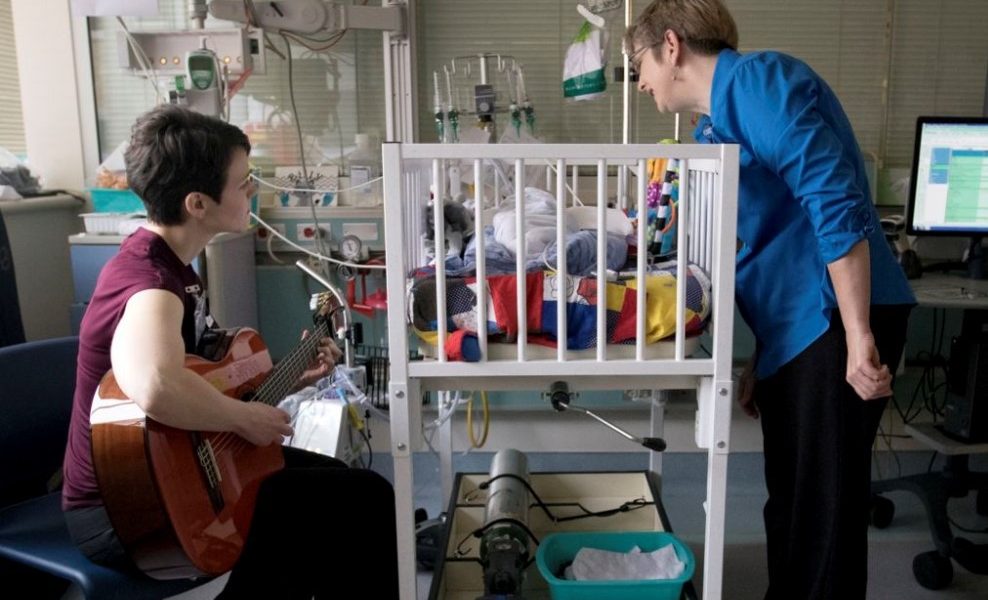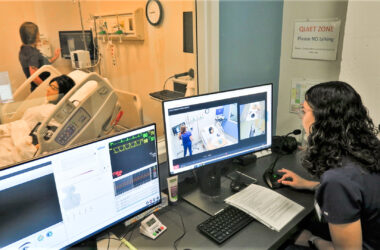The number of patients needing hospital care for the flu is rising, fueling the demand for beds by hundreds of children with a respiratory illness and adults suffering from Covid.
According to the Oregon Association of Hospitals and Health Systems, about 220 hospitalized patients had Covid in mid-November. That shot up to about 375 people by Monday. Dozens of them need intensive care, Oregon Health Authority data shows.
The agency tracks hospitalization numbers in the Portland area for influenza and an illness known as RSV, respiratory syncytial virus. Health authority data shows that cases of both of those illnesses are going up as well.
As of last week, more than than 20 people in the metro area were hospitalized for flu compared with 15 the week before. Another 45 people were hospitalized with RSV in the Portland area, and 35 of them were younger than 5, agency data shows. The virus can infect anyone, but usually children get it. Over the last three years, with many children wearing masks in schools and indoors, fewer got sick. With many no longer taking precautions to avoid respiratory infections, the virus is quickly spreading.
Patrick Allen, director of the Oregon Health Authority, warned that the state is facing a crisis in pediatric units.
“If you have young children and they get sick, there may not be a hospital bed for them,” Allen said in a statement.
Oregon has 45 pediatric intensive care beds and as of last week, only six were free. Among nearly 530 pediatric beds in the state, nearly 120 were available last week.
Earlier this month, Gov. Kate Brown declared a public health emergency as the demand for hospital beds tripled. That declaration makes it easier for hospitals to obtain volunteer medical professionals who are often retired and available to help out in emergencies.
At the same time, three Portland-area hospitals that treat many of the children hospitalized in Oregon – Doernbecher Children’s Hospital at Oregon Health & Science University, Randall Children’s Hospital at Legacy Emanuel Medical Center and Providence St. Vincent Medical Center – have declared crisis care standards for pediatric patients. Those guidelines, which were developed by the Oregon Health Authority during the pandemic, are activated when hospitals are overwhelmed with patients. The standards give the hospitals flexibility in allocating resources, especially staffing. That could mean that nurses, for example, in critical or acute care units care for more patients than normal, that others are brought in to do lower level tasks or that nurses work double shifts.
To help hospitals, the Oregon Health Authority recommends:
- Stay home when sick.
- Cover coughs and sneezes with the inside of your elbow or with a tissue that you immediately throw away after use.
- Clean and disinfect all surfaces that get touched, including doorknobs, faucets, chairs, countertops and tables.
- Regularly wash hands with soap and water or use hand sanitizer, especially after coughing or sneezing into a tissue.
- Get a flu shot and stay up to date on Covid vaccinations, including new bivalent boosters. There is no vaccine for RSV.
Randall Children’s Hospital has postponed some non-urgent procedures for children to stretch staff.
“At Randall Children’s Hospital, we are at 100% capacity for pediatric patients in both the emergency department and pediatric inpatient units,” Kristin Whitney, a spokeswoman, told the Capital Chronicle in a statement. “We are implementing creative and safe solutions to meet the community demand for pediatric beds, including pulling nurses to work extra shifts and pulling nurses from administrative roles and operating rooms.”
Dr. Genevieve Buser, a pediatrician at Providence St. Vincent, also said that health care professionals are concerned about rising numbers of sick patients, especially children: “We are caring for unprecedented numbers of very sick young people in our hospitals, immediate care facilities and clinics. Right now, more than half of our kids sick enough to be hospitalized have RSV (respiratory syncytial virus), and almost all of those are babies less than 6 months of age. It causes babies to need oxygen to breathe and even stop breathing.”
The Oregon Health Authority said it is trying to bring in more staff from out of state, but it didn’t release any details.
Officials at St. Charles Health System in central Oregon said they would like the state to help coordinate care.
“We believe it would be most helpful for the state to create a central triage and prioritization process for beds,” Lisa Goodman, a spokesperson for the health care system, told the Capital Chronicle. “We don’t currently have (a) good line of sight to how many pediatric beds, and PICU beds, are available.”
St. Charles, which has four hospitals in central Oregon, sends the sickest children to Portland hospitals but bad weather can hamper that transport, Goodman said.
In southern Oregon, officials at Asante in Medford are concerned about all pediatric patients.
“Our concern is to ensure we have capacity to care for all our pediatric patients, not just those with RSV,” said Lauren Van Sickle, the hospital system’s lead spokeswoman.
She said hospital officials have identified various locations where young people can be cared for outside the hospital while hiring more pediatric nurses.
In the days and weeks ahead, hospital officials expect a continued surge of patients following indoor Thanksgiving get-togethers when viruses easily spread.
“We expect this spike in illness to continue in the coming months,” Dr. Dana Braner of Doernbecher said in a statement.
Oregon Capital Chronicle is part of States Newsroom, a network of news bureaus supported by grants and a coalition of donors as a 501c(3) public charity. Oregon Capital Chronicle maintains editorial independence. Contact Editor Lynne Terry for questions: [email protected]. Follow Oregon Capital Chronicle on Facebook and Twitter.
STORY TIP OR IDEA? Send an email to Salem Reporter’s news team: [email protected].

Lynne Terry has more than 30 years of journalism experience, including a recent stint as editor of The Lund Report, a highly regarded health news site. She reported on health and food safety in her 18 years at The Oregonian, was a senior producer at Oregon Public Broadcasting and Paris correspondent for National Public Radio for nine years. She has won state, regional and national awards, including a National Headliner Award for a long-term care facility story and a top award from the National Association of Health Care Journalists for an investigation into government failures to protect the public from repeated salmonella outbreaks. She loves to cook and entertain, speaks French and is learning Portuguese.









